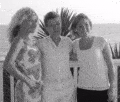Sweet Hopkins

Treatment: Mastectomy, chemotherapy, stem cell transplant and radiation
I began running in the Komen Race for the Cure in 1996 with a note safety-pinned to my back that stated, “I run in memory of my grandmother, Mary Hall Ware, and in honor of my mother, Jay Ware Deese.” One year I ran with my friends, focusing on my personal best time and passing women as I picked up my pace the last mile of the Race. Another year I ran while my husband, with our two daughters in strollers, cheered me on from the finish line. Another time I ran with one daughter at my side while my mother, free from cancer, walked with the other. We were celebrating my mother’s ten years of survivorship.
Every October I ran. As my daughters approached adolescence, I loved sharing the Race with them, and I was proud that I could push their pace and talk them through the rigors of completing a 5k. Then came the year when the Komen Race for the Cure became more than an opportunity to note my personal time. It became a Race that made me understand what winning a race was truly about.
I ran the year after my initial diagnosis of breast cancer; after a radical mastectomy, chemotherapy, stem cell transplant and radiation. That year the sign on my back changed to read, “I have run for my grandmother, my mother, my aunt, my cousin, my friends. This year I am running for me.” For four more years I ran; free from cancer but perhaps not as fast as I once was. But still I ran each and every step of the way.
Then came the year when I raced wearing a Ford scarf to cover my bald head, because for the second time there was breast cancer. In the midst of chemo, still I ran.
Four more years passed and the number of pink ribbons on my visor increased to eight. Then last October I did not run. I could not even walk or make it to NorthPark Center to watch. I was battling a recurrence of this disease; it had returned with a vengeance in my bones and liver. I was too weak and too sick to be a part of what had marked the fall season for me for almost twenty years.
But here is where my story takes a tremendous turn. Just in time for the Race, after twelve months of weekly chemo in a clinical trial, I reached remission…again. I am living my life 100 percent again—almost too miraculous to believe. This year I will be back at the Race, but for the first time I will not run. With tremendous gratitude and humility I will walk every step of the way with energy and joy. I can only imagine that finishing the Race will feel every bit as sweet as it did when I was younger and running to improve my personal best time. Now I understand what winning a race is truly about. As the streets pass by and I hear the crowd cheering us on, I will rejoice because I thought that my races were over. Yet God has given me more races to win and I now understand that the Race for the Cure is not just about the physical act of running—it’s about celebrating the race of life itself!
